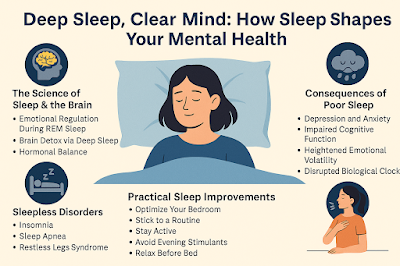🧠 Why Sleep Matters for Mental Health
Quality sleep is essential for emotional stability, memory, and resilience. Studies show chronic sleep loss increases the risk of depression, anxiety, and mood disorders .
🔬 The Science of Sleep & the Brain
1. Emotional Regulation During REM Sleep
REM sleep helps process emotions—when disrupted, it can worsen emotional responses .
2. Brain Detox via Deep Sleep
During deep sleep, the brain clears waste like beta-amyloid through the glymphatic system, preventing cognitive decline .
3. Hormonal Balance
Sleep regulates cortisol (stress), melatonin (sleep), and serotonin (mood). Imbalances lead to irritability and anxiety .
⚠️ Consequences of Poor Sleep
Chronic sleep deprivation can lead to:
- Increased risk for depression and anxiety
- Impaired cognitive function
- Heightened emotional volatility
- Disrupted internal body clock
🛌 Common Sleepless Disorders
- Insomnia: Linked with depression and mood disturbances
- Sleep Apnea: Causes daytime fatigue and anxiety
- Restless Leg Syndrome (RLS): Interrupts sleep, impacts mood
🛠️ Practical Sleep Improvements
-
Optimize Your Bedroom: Use blackout curtains, cool the room to 60–67 °F, and avoid screens 1 hour before bed.
-
Stick to a Routine: Sleep/wake times consistent daily; limit naps to <30 minutes.
-
Stay Active: Regular exercise (like walking or yoga) reduces anxiety and improves sleep.
-
Avoid Evening Stimulants: No caffeine after 2 p.m.; limit alcohol.
-
Relax Before Bed: Try breathing exercises, guided visualization, or journaling.
🔗 Related Reads on HealthXenon
- 👉 The Significance of Mental Health: Why It Matters More Than Ever
- 👉 Calm Within Chaos: Mastering the Art of Managing Anxiety in Daily Life
- 👉 Understanding the Gut‑Brain Connection: How Your Digestive Health Affects Mood
❓ Frequently Asked Questions
1. How much sleep is ideal?
Adults need 7–9 hours. Less increases risk for mood disorders .
2. Can better sleep improve depression?
Yes—sleep-based therapies significantly reduce depressive symptoms.
3. What's a good bedtime?
Sleeping between 10 p.m. and midnight aligns with natural circadian rhythms.
4. Are melatonin supplements safe?
Short-term use is generally safe; consult a healthcare provider before long-term use.
5. What if I can't fall asleep?
Avoid watching the clock. Instead, try light reading or calming audio until drowsy.
✅ Final Takeaway
Sleep isn’t just rest—it’s vital for mental health and emotional resilience. By prioritizing restful, quality sleep, you can significantly improve mood stability, cognitive function, and overall wellness.








0 Comments